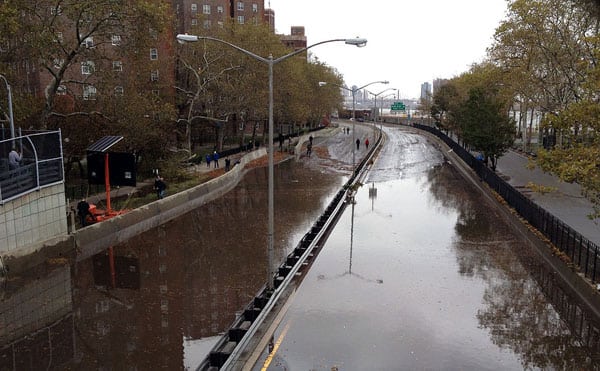
July 11, 2018; Next City
Hurricanes are coming; that much is certain. The NASA Earth Observatory explained how scientists think that global warming strengthens storms, and we’ve seen the evidence in the parade of superstorms that’s hit Puerto Rico, Houston, Miami, New York, and other US cities in the past five years. How will low-income residents, who often can’t afford flood insurance, adapt?
That question plagues New York’s affordable housing sector, where flood insurance is not common but the risk of damage from another storm like Hurricane Sandy is high.
Emily Nonko at Next City draws attention to the HDFC co-op housing that’s concentrated on New York’s Lower East Side. HDFC housing, which is subject to an income ceiling and flip-tax provisions, has stayed more affordable than other units in Manhattan, according to DNAInfo’s Amy Zimmer. Units sometimes sell for half the price of other co-op units. However, city data shows that over a quarter of these units suffer from either physical or financial trouble, either of which means they are poorly situated to cope with flood damage.
Alex Lee, a housing organizer and weatherization project coordinator with Cooper Square Committee (CSC), attempts to educate HDFC co-op residents about the risks and resources related to floods. “[Co-op] board members won’t necessarily know what a flood elevation certificate is, nor does their building necessarily have flood insurance,” he says. “The next step is up to them—how do they want to remain proactive?”
The resources available to residents with low or moderate incomes are insufficient. FloodHelpNY, a project of the Center for NYC Neighborhoods and the New York Governor’s Office of Storm Recovery, suggests ten programs for residents unable to pay for flood insurance, all of which are loans that have to be repaid, although they offer free resiliency reports to inform residents of their flood risk. Enterprise Community Partners began to offer recovery grants in 2017, but only distributed $1 million in Puerto Rico, USVI, Texas, and Florida. FEMA provides flood mitigation assistance, but only to structures that have insurance under NFIP.
Sign up for our free newsletters
Subscribe to NPQ's newsletters to have our top stories delivered directly to your inbox.
By signing up, you agree to our privacy policy and terms of use, and to receive messages from NPQ and our partners.
A study from the RAND Corporation determined that “the cost of flood insurance is currently burdensome for about one-quarter of households in owner-occupied one-to- four-family residences in the study area and is much more burdensome for lower-income residents.” In high-risk zones, it can reach $3,000. Athena Motavvef with WE ACT for Environmental Justice, a community activist group, said, “unless we confront the causes of climate change, low income and communities of color will continue to be unfairly impacted by it.”
The damage is certain to come, and low-income residents lack the resources for thorough preparation—so where will the money come from? New York has joined Massachusetts to sue ExxonMobil and other fossil fuel companies for damages related to climate change; if they succeed, funds would be made available. However, a few weeks ago, the Supreme Court tossed out similar lawsuits from California cities, which makes this prospect somewhat precarious.
Every aspect of this situation suffers from “not enough”—not enough money to shore up residents’ homes against damage or provide insurance against financial devastation, not enough awareness of the risks and resources related to hurricanes, not enough action taken to slow climate change, and not enough accountability from systems with money and clout for the way their actions impact lower-income communities.
As hurricane season approaches, groups like CSC are working to help residents prepare however they can. But to keep co-op homeowners from risking homelessness, more attention is needed.—Erin Rubin
Correction: This article has been altered from its original form to correct the name of the aspect of Enterprise that offered the grants.












